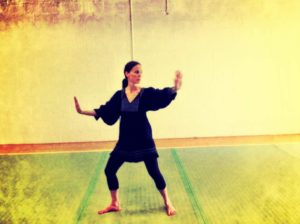
Tai Chi is a non-competitive self-paced system of gentle physical exercise and stretching. To do Tai Chi, you perform a series of postures or movements in a slow graceful manner. Each posture flows in to the next without pause, ensuring that your body is in constant motion. There are may different styles of Tai Chi such as Yang, Chen and Wu. Each style has its own set of movements and within each style there can be many variations.
Tai Chi is often described as “Meditation in Motion.” Coordinating rhythmic patterns of movement with breathing, Tai Chi helps you achieve a sense of inner calm. The concentration involved with Tai Chi forces you to live in the present moment putting aside distressing thoughts allowing the body to heal and balance itself both physically and emotionally.
“When the mind is at peace, the body knows no suffering.”

Benefits Include:
Increased Muscle Tone and Strength
Increased Cardiovascular Health
Increased Balance and Core Stability
Stress Relief & Greater Mental Focus
Relief from Chronic Pain & Arthritis General Health/Well-being and More!
Tai Chi and Qi Gong sessions are open to all levels and taught by Keith who has over 25 year of experience of training in martial arts, starting his career at the age of eight. Keith has trained with some the most well know Masters in the world traveling as far as Korea and Thailand to pursue his passion for teaching and training in Tai Chi, Meditation and Martial Arts. Please visit our Classes Page to see where and when our current session is happening.





